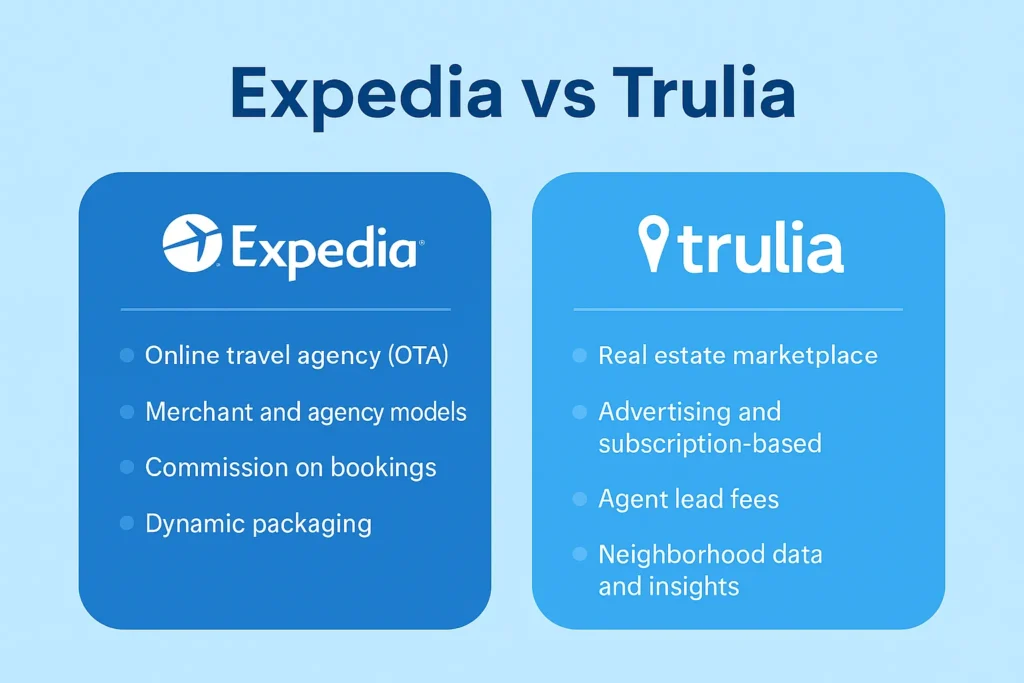In a rapidly evolving digital economy, the online travel and real estate industries continue to attract ambitious startups and forward-thinking entrepreneurs. With more users relying on mobile-first platforms for booking accommodations and finding properties, the business models behind platforms like Expedia and Trulia offer rich inspiration—and valuable lessons—for digital disruption in 2025.
Though they serve distinct sectors—travel and lodging vs real estate listings—they share core business principles like aggregator logic, data-driven monetization, platform scalability, and partner-driven growth. Comparing the Expedia business model with the Trulia revenue model helps founders identify which platform archetype best aligns with their app vision.
If you’re aiming to build a travel booking engine, a property marketplace, or a niche aggregator, this blog will unpack the models behind these tech giants and help you decide which to clone, pivot, or build from scratch.

What is Expedia?
Expedia is one of the world’s largest online travel agencies (OTAs). Launched in 1996 and headquartered in Seattle, the platform allows users to book:
- Flights
- Hotels
- Vacation packages
- Car rentals
- Activities
Expedia operates under the Expedia Group, which owns brands like Hotels.com, Vrbo, Orbitz, and Travelocity.
What Makes Expedia Unique?
- Aggregates listings from global partners
- Offers dynamic packaging (e.g. flight + hotel deals)
- Includes loyalty programs and travel rewards
- Uses AI for personalized recommendations
What is Trulia?
Trulia is a leading real estate marketplace for home buyers, renters, and real estate agents. Founded in 2005 and acquired by Zillow in 2015, it provides:
- Property listings (buy, rent)
- Market data and price trends
- Crime maps and school ratings
- Agent and broker connections
It’s used by people looking to move, rent, invest, or find homes based on lifestyle metrics.
What Makes Trulia Unique?
- Integrates lifestyle data into real estate search
- Provides deep analytics on neighborhoods
- Acts as a lead-generation engine for realtors
Expedia Business Model Breakdown
Revenue Model
- Merchant Model: Expedia purchases inventory (like hotel rooms) at wholesale rates and sells at retail prices.
- Agency Model: Partners (e.g., airlines) list inventory and Expedia takes a commission on bookings.
- Advertising Revenue: Through the Expedia TravelAds platform.
- B2B Services: APIs for travel partners, white-label services.
Cost Structure
- Partner payouts (hotels, airlines, etc.)
- Platform infrastructure (cloud, payment gateways)
- Marketing (paid ads, influencer campaigns)
- Customer service operations
Key Partners
- Hotels, airlines, car rental firms
- Global distribution systems (GDS)
- Travel influencers and content creators
Growth Strategy
- Acquisitions (Vrbo, Travelocity, etc.)
- Expansion into AI travel assistants
- Dynamic pricing and bundling
- Partner loyalty integrations
Learn More: Business Model of Expedia and Revenue Strategy
Trulia Business Model Breakdown
Revenue Model
- Advertising Model: Real estate professionals pay to promote listings.
- Subscription Model: Agents subscribe to premium services.
- Lead Generation Fees: Brokers and agents pay for verified leads.
- Partnership Data Licensing: Monetizes location and property insights.
Cost Structure
- Data acquisition and verification
- Platform engineering and updates
- Sales team for agent onboarding
- Content moderation and legal
Key Partners
- MLS (Multiple Listing Services)
- Mortgage providers and home insurers
- Real estate agencies and brokers
Growth Strategy
- Integration with Zillow’s ecosystem
- Mobile-first UX and location intelligence
- Content SEO and neighborhood storytelling
- AI-matched buyer-agent pairing
Learn More: Business Model of Trulia | Real Estate App Revenue Strategy
Expedia vs Trulia: Business Model Comparison Table
| Feature | Expedia | Trulia |
|---|---|---|
| Industry | Travel & Tourism | Real Estate |
| Revenue Model | Merchant + Agency + Ads + B2B | Ads + Subscription + Lead Gen |
| Target Users | Travelers, vacationers, business users | Home buyers, renters, real estate agents |
| Primary Monetization | Booking fees, commissions | Ad placements, paid leads |
| Key Partners | Hotels, airlines, car rentals | Brokers, MLS, lenders |
| Platform Focus | Booking engine with loyalty features | Search engine with lifestyle data |
| Ownership | Expedia Group | Zillow Group |
| Growth Channels | Acquisitions, SEO, bundling | Data, Zillow integration, agent tools |
Pros & Cons of Expedia’s Model
Pros
- High-volume transactions
- Strong B2B and B2C ecosystem
- Ability to upsell services (car, hotel, activities)
- Huge brand recognition and global reach
Cons
- High operational costs (inventory management)
- Complex partner negotiations
- Competitive space with price wars
Pros & Cons of Trulia’s Model
Pros
- Data-rich and SEO-driven
- Predictable, recurring revenue via agent subscriptions
- Scalable with limited operational overhead
- Niche targeting through neighborhood-level data
Cons
- Relies heavily on ad revenue
- Subject to real estate cycles
- Lower transaction frequency compared to OTAs
Market Data: Growth, Revenue, and Funding
Expedia Group
- 2024 Revenue: $12B+
- Brands Owned: Vrbo, Hotels.com, Orbitz, Egencia
- Funding: Public company (NASDAQ: EXPE)
- User Base: 100M+ annual users
Trulia (Zillow Group)
- Zillow 2024 Revenue: $2.2B (Trulia share estimated at ~20%)
- Listings: 135M+ properties
- Funding: Part of publicly traded Zillow Group
- User Base: 35M+ monthly active users
Which Model is Better for Startups in 2025?
If you’re building a transactional platform—like travel bookings, experiences, or bundles—Expedia’s model offers higher per-user revenue but demands significant logistics and partner networks.
If your focus is on data aggregation, ad monetization, or subscription funnels (especially in real estate or hyperlocal services), Trulia’s model is leaner and easier to scale with lower overhead.
Choose an Expedia-Style Model If…
- You want to build a travel-tech app or booking engine
- Your platform includes dynamic bundling of services
- You plan to integrate with hotels, airlines, or OTAs
- You’re targeting high-margin, high-traffic verticals
Build Your Own Expedia Clone with Miracuves
Choose a Trulia-Style Model If…
- You’re launching a real estate discovery app
- You want to offer advertising or paid leads to agents
- You’re focusing on neighborhood data and personalization
- You want to scale with SEO and localized content
Launch Your Own Trulia Clone with Miracuves
Conclusion
Whether you’re inspired by Expedia’s booking empire or Trulia’s data-driven marketplace, the blueprint is clear: Platforms that provide value, simplicity, and automation dominate in 2025.
At Miracuves, we help founders like you build, customize, and scale platform-based apps. From travel-tech to proptech, our Expedia and Trulia clone solutions come with pre-built modules, modern tech stacks, and marketing-ready UIs.
Launch faster, scale smarter—partner with Miracuves today.
FAQs
1. What is the key difference between Expedia and Trulia?
Expedia focuses on travel bookings, while Trulia is a real estate discovery and ad platform.
2. How does Expedia make money?
Through commissions on bookings, ad placements, B2B APIs, and vacation packages.
3. How does Trulia generate revenue?
Primarily from agent advertising, premium subscriptions, and lead-generation fees.
4. Which model suits a small startup better?
Trulia’s ad-based and SEO-driven model is more cost-efficient for bootstrapped startups.
5. Can I build a travel or real estate clone app?
Yes. Miracuves provides ready-to-launch Expedia and Trulia clones with full customization options.








